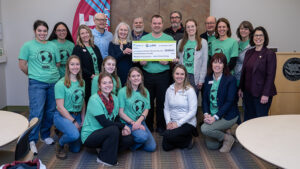Pictured: UWRF students, staff, faculty and other officials celebrate the announcement that the university placed first in a statewide competition to give away kits to make off-campus housing where students live more energy efficient. Photo courtesy of UWRF.
UW-River Falls students and staff have spread the word about the importance of sustainable practices. Their effort has resulted in a first-place designation in a statewide competition.
UW-River Falls won the Higher Education Kit Challenge, a competition sponsored by Focus on Energy. A total of 11 colleges and universities in Wisconsin participated in the competition from July 1 to Oct. 31.
Students with the Sustainability Office combined forces with university faculty and staff to give 140 free kits containing items to reduce energy usage in off-campus housing where students live. That figure was compared to the number of off-campus students at UWRF. The university wound up with the highest percentage compared to competing schools.
The award includes $5,000 from Focus on Energy that UWRF can use toward any sustainability-related effort on campus.
Heather Feigum, program manager with Focus on Energy, praised students and staff for their hard work distributing sustainability kits. Those kits totaled 7,420 kilowatt hours in reduced energy annually, she said.
“The energy savings from the kits distributed here cover one house for more than one year,” she said. “Taking one house off the grid for more than one year is a significant accomplishment.”
Sustainability Coordinator Mark Klapatch-Mathias said educating people about sustainability through the contest is the most gratifying part of winning.
“The awareness about sustainability is the biggest part of this,” he said. “These measures will save people money in the long run, and for them to get these items for free knowing that it will save them money is a really great approach. It makes them more willing to give this a try.”
The items in the kits included LED light bulbs, low-flow shower heads, efficient light switch covers, and low-energy nightlights. Items that make homes more energy efficient can be expensive and out of the financial reach of most college students, says Lauren Schmelzer, a UWRF senior majoring in environmental science. She says providing the items them for free was an enjoyable aspect of the project.
“One of the best parts of this is that it makes sustainable practices more affordable to more people,” Schmelzer said. “In the process, they are learning about different ways of living more sustainably.”


